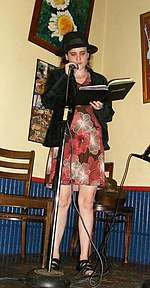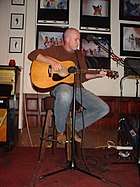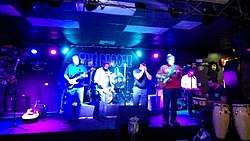Open mic
An open mic or open mike (derived from the expression "open microphone") is a live show at a coffeehouse, nightclub, comedy club, strip club, institution or pub at which audience members who are amateur or professional may perform, often for the first time, or promote an upcoming performance, are given the opportunity to perform onstage.[1] Typically, as the name suggests, the performer is provided with a microphone which is plugged into a PA system, to make the individual's performance loud enough for the audience to hear. Often the performers sign up in advance for a time slot with the host or master of ceremonies, typically an experienced performer or the venue manager or owner. The master of ceremonies may screen potential candidates for suitability for the venue and give individuals a time to perform in the show. These events are focused on performance arts like poetry and spoken word, music (often singer-songwriters who accompany themselves on guitar), and comedy. Less commonly, small groups, such as a small rock band duo/trio or a comedy duo may appear. Group performances are uncommon, because of the space and the logistics of loading in and soundchecking such a group. In strip club terms, amateur night is a contest for everyday women and men who compete for a cash prize by taking their clothes off just like everyday strippers.

Open mic nights may have no cover charge, or a very low cover charge, although the venue may have a gratuity jar, "pass the hat" for donations or hold a raffle with various prizes. Venues that have no charge make revenue from selling alcoholic beverages and food. The performers are not typically paid, although the venue may recompense the performers with a beverage or meal. The host or MC, as an experienced professional, is usually paid for their services. The host or MC may perform at some point during the evening, either a full set or to fill in when an amateur member is not available for their slot. Open mic events are somewhat related to jam sessions, in that in both cases amateur performers are given the opportunity to sing or play instruments. The difference is that jam sessions often involve musical ensembles, possibly even a house band or rhythm section and a jam session may involve the participation of professional performers, especially at a high-end jazz club.
Poetry and spoken word
Poetry and spoken word open mics feature a host, who is normally a poet or spoken word artist, poets and spoken word artists, and audience members. A sign-up is done before the show begins, so that the host has a list of names to call from. Some spoken word artists use pseudonyms or stage names when they perform. Poetry/spoken word open mics range from laid back, serene settings to lively sessions where readers and/or performers compete for audience applause. They are usually held in libraries, coffee houses, cafes, bookstores and bars.
Each poet or spoken word artist is often asked to keep their performances to a minimum/specified time slot, giving each performer enough time to share some of their work with the audience. The host or MC acts as a "gatekeeper", determining which performers are suitable for the event. If a performer goes over their time limit, the host diplomatically thanks the performer for their contribution and asks them to yield the stage for the next performer.
Comedy
comedy open mic nights can be held at established comedy clubs, but they are more commonly held at other venues with or without a stage, often the upstairs or back room of a pub or bar,[2] bookstores, colleges, rock clubs, and coffeehouses.[3][4] They are also held in uncommon areas such as strip clubs[5] and comic book shops.[6]
Such nights give newer or emerging comedians an opportunity to practice and improve,[7][8] with a view to getting paid work in the future. The audience for a typical comedy open mic is other comedians.[9] Those underage must have their parents attend clubs with them.[10] More experienced comedians may use open mics as an opportunity to work out newer material or a new character,[11] as the audience is not paying in anticipation of seeing their normal act. Open-mic comedy nights are most widespread in larger English-speaking cities with a well-established stand-up comedy scene (esp. London and New York City).
Comedy format
The average format is "show and go."[12] In a typical open mic night, acts will get three to seven minutes of stage time.[19] A first-time open mic-er needs approximately three minutes of material for a five-minute slot.[20][21] An open mic should be no longer than ninety minutes or be more than fifteen acts.[22] A comedy open mic will not normally exceed 30 people.[23]
The light
A comedian will get "the light" (often a mobile/cell-phone[24]) one minute before their set is over, to finish up the joke they're on.[25][26] Those who ignore the light might get banned from that mic.[26][27][28]
Other types of comedy open mics
Other types include booked shows and bringer shows. Booked shows have a normal format, but performers reserve spots (one week to month) in advance. Bringer shows are presented in a showcase format, with each performer mandatorily bringing 5–15 people (with a cover charge and a two-drink minimum, per person) and is seen as exploitative.[29]
Music

These shows provide an opportunity for emerging musicians to gain experience performing to a live audience without having to go through the process of getting normal music gigs, which is very difficult to do without experience or a demo recording. Open mics provide an outlet for singer-songwriters. Prior to their popularity, the only outlet generally were folk clubs, which were not always friendly towards creators of new music, preferring traditional, well-known music. They also suggested that music performed by acoustic musicians or solo artists in this manner would necessarily be folk music, a misconception that still commonly exists today. Some organizers have chosen the title "acoustic night" or "acoustic club" in an attempt to indicate an event run broadly on the lines of a folk club, but with a much wider range of musical styles.
Open mic events are most commonly held in the middle of the week or at the very end of the weekend when footfall through venues is low. They rarely occur on the hallowed Friday and Saturday night time slots when venues are busy with weekend revellers and any live performance is usually specifically booked, professional artists. The most common night for a UK open mic event is Thursday, followed by Wednesday.[30]
In the United Kingdom, the largest ongoing open mic-styled music contest is Open Mic UK, which regularly attracts 10,000 participants of all genres. The grand prize for the contest is an investment up to £30,000. The size of the event has necessitated that all participants sign up for performance slots beforehand, instead of simply walking onstage.[31][32]

A popular open mic arrangement in the United States is the "Blues Night". In this format a bar or club will dedicate a particular night, usually in the middle of the week, as being "open mic blues night". The establishment may supply a house band, typically guitar, bass and drums, sometimes a keyboard. Singers, guitarists, harmonica performers who wish to play sign up, usually with the master-of-ceremonies or host. This person is tasked with screening the performers, choosing and ordering, and getting the performers on and off stage in a polite manner.
Since the songs chosen need to be simple enough so that a band of musicians who have not played together can perform them without practice, blues standards are used. Songs might be announced as a "12-bar fast shuffle in C" or "slow 12-bar blues in F", or similar phrases, that should be familiar to all concerned. Lead singers, keyboards, horn players, (usually saxophones) and various percussion instruments are common additions.[33]
Strip club
In most strip clubs, amateur night is a contest held by the clubs themselves where women and men compete for cash by stripping just like their stripper counterparts.[34][35]
Rarer niche variations
The terms "open deck" (where deck refers to the kind of turntable used by a DJ) and "open reel" (where reel refers to a 35 mm film reel) are used for more niche open mic events where keen amateurs can meet to exhibit and critique their skills/artform. A decrease in the cost of consumer video technology combined with the powerful editing capabilities of modern PCs has caused an increase in the popularity of DJing and amateur filmmaking, but these types of events are still very rare.
See also
- Open Mic UK (music competition in the UK, 2008–)
- The Raving Poets (open mic poetry with live musical backing 2000–2010)
References
- Zimmer, Ben (29 July 2010). "How Should 'Microphone' be Abbreviated?". The New York Times Magazine. New York: The New York Times Company. Retrieved 4 April 2020.
Mike came first, documented from the early days of radio. In the June 1923 issue of 'The Wireless Age,' a photo caption of Samuel L. Rothafel…reads, ‘When you hear Roxy [Rothafel] talk about 'Mike' he means the microphone.’ This suggests the abbreviation arose as a kind of nickname, playfully anthropomorphizing the microphone as Mike. But by 1926, when the pioneering broadcasterGraham McNamee published his book ‘You're on the Air,’ mike appeared in lowercase, not as a name…Mic didn't begin appearing in written works for another few decades, first recorded by the Oxford English Dictionary in Al Berkman's 1961 ‘Singers' Glossary of Show Business Jargon.’ Berkman offered both mike and mic as possible clippings of microphone. Since then, mic has grown in popularity among those who work with recording equipment.
- Durham, Rob (2011). Don’t Wear Shorts on Stage: the stand-up guide to comedy. Middletown, DE. p. 16. ISBN 9781468004847.
Each comedy club or bar has its own system for signing up for [an] open mic.
- Carter, Judy (2001). The Comedy Bible: From Stand-up to Sitcom—The Comedy Writer’s Ultimate How-To Guide. New York, NY: Simon & Schuster. pp. 66–67. ISBN 978-0-7432-0125-4.
- Bromley, Patrick (6 June 2018). "How to Break Into Stand-Up Comedy". ThoughtCo. Potdash. Retrieved 22 March 2019.
[Open mics] could be held anywhere, but are often found at bars, rock clubs, and coffee houses.
- Isador, Graham (2 May 2018). "Comedians Tell Us the Most Epic Fails They've Seen at Open Mics". VICE. VICE MEDIA LLC. Retrieved 18 February 2019.
The worst open mic I ever attended was at Zanzibar, a strip club in downtown Toronto.
- Master, Julian (2 April 2016). "An Aspiring Stand-Up Comic Shoots Empty Open Mics Across NYC". VICE. VICE MEDIA LLC. Retrieved 18 February 2019.
- Bromley, Patrick (13 April 2018). "Breaking Into Stand-Up: 10 Tips for Beginner Comedians". ThoughtCo. Potdash. Retrieved 22 March 2019.
It's a true ‘learn-by-doing’ art form, and you won't know what works (and what doesn't) until you've gotten on stage in front of an audience.
- Lagatta, Eric (21 March 2019). "Budding, established comedians hone craft at open-mic nights". The Columbus Dispatch. GateHouse Media, LLC. Retrieved 25 March 2019.
Most comedians see open-mic nights as a chance to test new material or refine their stage presence.
- Freeman, Zach (30 May 2019). "10 reasons why Cole's is the best comedy open mic in Chicago". Chicago Tribune. Retrieved 12 April 2020.
If you’ve ever been to a typical open mic, you’re probably a comedian yourself. In other words, the audiences can be sparse, and they’re mostly waiting for their turn at the microphone.
- Batz, Jr., Bob (10 June 2003). "A STAND-UP KID: Teen comic dreams of a wisecracking career". Pittsburgh Post-Gazette (Post Gazette Staff Writer). Retrieved 8 April 2019.
- Oswalt, Patton (14 June 2014). "A Closed Letter to Myself About Thievery, Heckling and Rape Jokes". Patton Oswalt. Patton Oswalt. Retrieved 3 February 2019.
Open mikes are where, as a comedian, you’re supposed to be allowed to fuck up.
- Martin, Sarah. "Comedy Open Mic Formats & Etiquette". Vocal. Jerrick Ventures LLC. Retrieved 4 April 2020.
Show and Go/Show Up…[t]his is most common type of open mic...[a]ll you have to do is show up...[and p]ut your name on the list
- Bunce, Alan (13 January 1989). "What's So Funny, America?". The Christian Science Monitor. Mort Sahl. Retrieved 10 September 2019.
Today kids come on[stage at open mics] for five minutes each and curse because of a poverty of language or because they've seen too many R-rated movies.
- "PDX Comedy Blog". PDX Comedy Blog. Portland, OR, USA. Retrieved 18 February 2019.
- Durham, Rob (2011). Don’t Wear Shorts on Stage: the stand-up guide to comedy. Middletown, DE. p. 21. ISBN 9781468004847.
[Y]ou'll get four or five minutes to perform.
- Ball, Joseph (25 July 2018). "I Did Stand-Up Comedy For The First Time And Didn't Become A Punchline". Indianapolis Monthly. Indianapolis Monthly. Retrieved 25 March 2019.
Those three minutes felt like 30, in a good way
- Luschei, Abby (25 July 2018). "Advice from five Salem comedians on getting started doing stand-up". statesman journal. Part of the USA Today Network. Retrieved 25 March 2019.
Each comic gets five minutes
- Neill, Geoffrey (22 December 2015). Hitting Your Funny Bone: Writing Stand-up Comedy, and Other Things That Make You Swear. San Bernardino, CA. p. Chapter 6. ISBN 9781515180661.
(It’s usually three to four minutes).
- [13][14][15][16][17][18]
- Durham, Rob (2011). Don’t Wear Shorts on Stage: the stand-up guide to comedy. Middletown, DE. pp. 9–10. ISBN 9781468004847.
You need just three minutes of material...enough time to perform several jokes, get a few laughs, and then get off [the] stage.
- Bienenstock, David (20 November 2017). "Bob Saget Helped Me Prepare for My Stand-Up Debut" (Interview). VICE. Bob Saget. VICE MEDIA LLC. Retrieved 18 February 2019.
It’s really just three to five minutes that you need to write and then hone
- Durham, Rob (2011). Don’t Wear Shorts on Stage: the stand-up guide to comedy. Middletown, DE. p. 20. ISBN 9781468004847.
Open mic night really shouldn't have more than fifteen acts...[or] ninety minutes.
- Hannibal Buress (3 August 2018). Hannibal Buress: Advice for Comedians. The Atlantic. Event occurs at 3:12–3:22. Retrieved 10 September 2019.
[M]ax, 30 people, 'cause that's the max people that should be at an open mic
- Lagatta, Eric (21 March 2019). "Budding, established comedians hone craft at open-mic nights". The Columbus Dispatch. GateHouse Media, LLC. Retrieved 25 March 2019.
Any comic nearing the time limit would face a warning: Moore waving his cell-phone flashlight.
- Durham, Rob (2011). Don’t Wear Shorts on Stage: the stand-up guide to comedy. Middletown, DE. p. 21. ISBN 9781468004847.
The light will normally be flashed when you have one minute left in your set.
- Ewing, Creig (25 July 2018). "The secret to comedy? Time… hard work". LEO Weekly. LEO Weekly. Retrieved 25 March 2019.
Usually the host will shine a light to let the comedian know a minute is left. If you keep going, it’s called blowing the light, and it is a sin.
- Borns, Betsy (1987). Comic Lives: Inside the World of American Stand-up comedy. Simon & Schuster, Inc. p. 179. ISBN 0-671-62620-5.
Staying onstage longer than their allotted time is, along with joke stealing, one of the most grievous offense a stand-up can commit.
- Neill, Geoffrey (22 December 2015). Hitting Your Funny Bone: Writing Stand-up Comedy, and Other Things That Make You Swear. San Bernardino, CA. p. Chapter 6. ISBN 9781515180661.
- Kelly-Clyne, Luke (20 September 2018). "I Want Out: How to Leave the Boring Job You Don't Like and Start Your Comedy Career". Vulture: Devouring Culture. NEW YORK MEDIA LLC. Retrieved 4 April 2020.
In order to get stage time at [bringer shows]…you [have to] bring…5 to 15 friends, each of whom must show up and agree to buy at least two drinks…Some people think bringers are a scam, and they kind of are. They’re a cash grab for club owners
- "Open Mic Finder Statistics". Open Mic Finder Statistics. Retrieved 23 February 2013.
- "2010 Winners". Open Mic UK. Retrieved 12 May 2011.
- Almroth-Wright, Indy (6 December 2008). "Twleve year-old 'Birdy' wins UK talent contest". BBC (Hampshire). Retrieved 15 April 2011.
- rayray. "Phoenix Blues Jams". www.rayrayblues.com.
External links
- Aldredge, Marcus. "Negotiating and Practicing Performance: An Ethnographic Study of a Musical Open Mic in Brooklyn, New York."
- Aldredge, Marcus. 2013. Singer-Songwriters and Musical Open Mics. Farnham, UK: Ashgate.
- Kim, Jonathan (26 July 2013). "The World's Best and Longest-Running Comedy Open Mic Just Closed". Huffpost. Retrieved 12 April 2020.
- Dingfelder, Sadie (30 July 2015). "A nearly comprehensive list of D.C. area open-mic comedy nights". The Washington Post. Retrieved 12 April 2020.